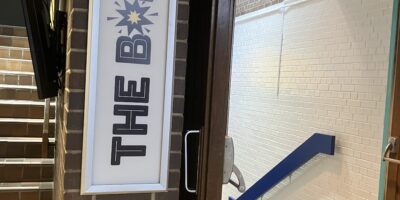Before I begin on the main topic of this issue, as usual I must quickly comment on some unrelated topics. I want to try to keep these comments brief, because the person that is the main focus of this report deserves as many of these 1700 words as possible. Firstly, notes on the second issue. The team was done before midnight on the Sunday of the production week, a demonstration of the quality of my staff and experience gained on my part. I would like to extend thanks to my dutiful editors, and to all of the first years who came in to give the layout a shot, particularly to Cameron Soltys, who laid out the better part of two pages in his first attempt at InDesign. Cameron is a much quicker learner than myself!
This issue is heavy on the Olympics, so in an effort not to bore readers on Sochi, I will keep my personal comments on the event brief, but I feel strongly enough that I must say something. For decades, the Olympics have presented a double edged sword of morality. On one side we see controversy; including but not limited to frequent corruption scandals, rigged judging, cost overruns, and steroid scandals. On the other side, we see human triumph, the value of work ethic, sportsmanship, and we are reminded that mankind truly is a magnificent species. Also, the success of our athletes reminds us that although Canada never places national glory over personal freedoms, we are still able to achieve the former; a true testament to Canadian work ethic, pride, and patriotism. The Olympics, even with all its flaws, are a tribute to human achievement and Canadian values, and I believe they provide a net benefit to the world. Cheers to Sochi 2014 and I look forward to watching the Olympics for many years to come.
Now, I must move on to the main topic of this article, my late grandfather Clinton Colwill, better known to us grandkids as “Grampie.” A lot of my friends laughed at this term of endearment, but to us there was no better name for the man. He was everything a grandkid could ask for and more: caring, insightful, and always up for an adventure. He was also a very quiet man, unafraid to speak his mind but also felt no need to fill silence with banter (a quality I did not inherit, for the record). These words do little to describe a man with so many positive qualities, and I think it is valuable for me to expand on the life of Clinton Colwill, a man that I will always be proud to have called “Grampie.”
My grandfather was born in the tiny farming community of Northam, Prince Edward Island on March 3, 1930. He was the third child in a family of eight, and like most Island families at the time, frivolousness was unheard of. He dropped out of school in eighth grade to work on the farm (out of necessity, not out of disregard for education) and stayed there until 1963. With advancements in farming technology, the days of the family farm were dying. Determined to make it work on the Island for my grandmother (Jean, still alive and healthier than I will ever be), my mother (Darlene) and my uncle (Barry), my grandfather took over farming duties and worked another job as a bricklayer to try and make Island life possible. Despite working outrageous hours in back breaking jobs, my grandpa foresaw that life on the Island held little future; it would be one of poverty, or of government dependence. Both options were equally undesirable for such a proud man. As such, he sold the farm and moved the family to Toronto. The intimidation presented by such a move must have been overwhelming for a family used to a simple life on a Prince Edward Island farm. My mom still speaks of how she was awed by “all the buildings” when she arrived. Insightful though he was, there was no way my grandfather could have foreseen the pivotal role he would have in shaping our country’s largest city when he arrived there.
An immigrant from the same country, my grandfather had to scrape from the bottom of the barrel for years to support his family, which, soon after their move to Toronto, expanded to include my other uncle, Scott. He worked menial, laborious jobs at gas stations and the like for privileged city residents while attending night class to complete his high school education. My grandmother, also no slouch, baby sat during the day in their tiny two-bedroom apartment to bring in some desperately needed cash. I was often told that these were hard times, but I was also reminded that there was always food on the table and that a good time was never far off for my grandparents even when life was so stressful. Despite these hard times, I can say with confidence that my grandparents never whined. They did what they could: they worked, they raised their kids, and they still enjoyed life. Eventually, all the scraping by and determination paid off. My grandfather would eventually obtain his Elevator Technician’s license, a trade that had been taken up by several of his family members and one that still features prominently among my mom’s cousins and younger generations of my family (including my uncle, Scott).
Unfortunately, my knowledge on the next few years of my grandfather’s life is not as extensive. What I do know, however, is that he quickly moved up the ranks to become one of Otis’ top big job foremen. This was a significant accomplishment, especially considering his late coming to the trade, and some severe health issues (when my grandfather was diagnosed with cancer he had to chronicle his entire health history, which took close to an hour, according to my mother). During his memorial service, one of his old elevator friends sent in a letter describing my grandfather as Otis’ “best big job foremen.” His importance to Otis would be highlighted by the biggest job of his career, as an elevator foremen for the construction of the CN Tower. For the majority of the project, my grandfather oversaw the construction of a complex arrangement of elevators in the world’s tallest building at the time. (It was to hold the title for another 34 years.) When my grandfather retired, he was able to proudly state (not that he did very often) that he was integral to the construction of one of our country’s most recognizable symbols and one of the world’s great engineering marvels. Only slightly over a decade removed from working for cents on the hour at a gas station, my grandfather had played a major part in building the identity of one of the world’s greatest cities and nations. I’m sure if you were able to ask him, he would state that building the CN Tower was his easiest job yet, a day in the park compared to working at a farm and bricklaying for 15 hours a day.
My grandfather rarely spoke of his experiences in shaping Toronto, I doubt highly that he believed his contributions were as great as I see them, which is unfortunate, but I respect his reserved nature nonetheless. I’m sure that, to Clinton Colwill, he was only doing what every adult needs to do, to provide for his family by his own means. He did this and more. I hope that my shortened recap of his professional career was not too rife with historical errors. If so, I am sure my family will correct me on it. I think it is also important for you readers to understand why I personally had so much respect and admiration for my grandfather, professional career aside. Unfortunately I am running out of words to illustrate this admiration in great depth, but I just want to speak of a few specific traits of my grandfather that struck me as so impressive.
The first trait I want to comment on is how reliable and diverse my grandfather’s skill set was. He was a man of many talents. An outstanding woodworker, he could also act as a plumber, electrician, mechanic, gardener or pretty much any variety of handyman you care to think of. These traits made him a desirable asset for relatives performing renovations or projects of any kind. Not only was he happy to oblige, he was almost always the hardest worker present (with the possible exception of my grandmother, of course) and his ability to simply “get shit done” always blew me away. His knack for swiftly finding the quickest solution possible was uncanny, and I hope that as an engineer I will be able to embody some of his problem-solving ability. Less than a year after a double knee replacement in his mid-seventies, my grandfather went up, cane in hand (except when he needed both for the chainsaw, of course), to his brother Ernie’s for their annual woodcutting weekend, falling and gathering lumber from countless trees. A shining value of perseverance, my grandfather proved that a man is as strong as his will on that weekend, and I will always be inspired by his grit and determination.
Another story I want to include is one not of work ethic, determination or willpower, but instead one of sheer kindness. Five Christmases ago my grandfather gave me the greatest gift I have ever received, and likely ever will receive. After opening all of our gifts, the five grandsons were called over for one final gift. As Grampie stood proudly nearby, we each pulled a handmade wooden clock from the gift bags. We were all awestruck and deeply touched. I swear he must have started those clocks in April, and I will always cherish the clock that my grandfather made. What I find even more magnificent is that I wager my grandfather would have been just as proud of these handmade keepsakes as he was of the CN Tower. Nothing could have made him prouder than making us happy, and I still miss his calming demeanor and the feeling of safety he provided to us.
At 81 my grandfather was diagnosed with lung cancer, which had already spread to his bones and lymph nodes. Upon being told he had months to live, my grandfather did not even blink an eye. Always true to character, he accepted what was and moved on to prepare my grandmother and his family for the inevitable. I spent as much time with him as I could in his final months, despite how difficult it was for me to watch a man of such stature be crippled by such a terrible disease. I heard of his passing by phone at home while my grandmother, mother, and uncles were by his side at his home in Bradford, Ontario. After hanging up the phone I looked outside the window of my porch and saw a raccoon standing and looking in the glass at me, and I felt a level of calm that did not match the circumstances. After staring at me for a couple minutes, he turned and walked off into the dark. I like to think that this was a reminder that my grandfather is still with me, watching and reassuring. The next day my dad told me the raccoon was probably attracted to the tuna we had barbecued the night before. This could be true. Either way, my grandfather’s legacy stands 550 metres above the Toronto skyline, or in the ticking of his homemade clocks. I can proudly tell my own children and grandchildren about how he built the CN Tower, but for me, it will always be the silent ticking of his clock that brings me peace.




Leave a Reply